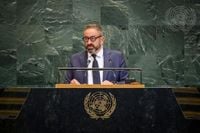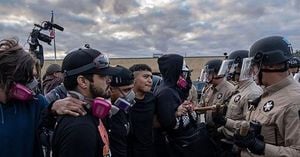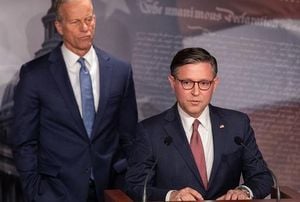In a flurry of diplomatic declarations that has reverberated across the international stage, several major Western countries have recently recognized the state of Palestine, sparking a heated debate about the motivations behind such moves—and raising pointed questions about why similar recognition has not been extended to Taiwan, a vibrant democracy with all the trappings of statehood. The wave of recognitions, occurring in late September 2025, has drawn both praise and skepticism, with critics branding the gestures as more symbolic than substantive.
Britain, Australia, and Canada led the charge, formally recognizing Palestinian statehood in the final days of September, with France joining them on Monday, September 29, 2025, according to CommonWealth Magazine. The official statements from these governments were couched in the language of morality and peace. British Prime Minister Keir Starmer, for instance, spoke about “combat[ting] hatred,” “peace,” and the “two-state solution,” but notably stopped short of outlining any concrete steps to resolve the ongoing conflict in Gaza. Canadian Prime Minister Mark Carney described the recognition of Palestine as a “panacea,” one that is “firmly aligned with the principles of self-determination and fundamental human rights.” Yet, as CommonWealth Magazine pointed out, the statements offered little in the way of practical solutions to the region’s entrenched problems.
The reality on the ground in Palestine complicates the picture. Despite these recognitions, Palestine lacks many of the essential features of statehood. It has no standing military, no national currency, and, perhaps most crucially, no clear territorial sovereignty. Israel maintains control over the skies, waters, and most of the land between the river and the sea. The West Bank, for example, is crisscrossed by Israeli roads, with only pockets of Palestinian control—most notably in Area A, which is nominally governed by the Palestinian Authority (PA). However, the PA’s grip is tenuous, particularly in volatile areas like Jenin, where radical groups have gained ground, leading to repeated cycles of violence and Israeli military incursions.
Gaza, too, remains a flashpoint. The closest Palestinians have come to true statehood was after Israel’s withdrawal from Gaza in 2005. Yet, as history has shown over the past two decades, that experiment quickly devolved into chaos, with devastating consequences for the people living there. As CommonWealth Magazine notes, “few would argue that the 20 years that followed have been anything other than a catastrophe.”
Despite these harsh realities, the recent recognitions have been framed by Western leaders as acts of courage and moral clarity. But critics, such as commentator Harry Jenkins, argue that the recognitions are largely “tokenistic,” serving more to burnish the moral credentials of Western governments than to effect real change. “No matter how much Starmer or anyone else may wish otherwise, the decision to recognize Palestine will not change the reality on the ground,” Jenkins writes. “It will not make the borders of a possible Palestinian state any clearer, nor will it make the Palestinian political situation any less divided.”
The debate over Palestine has also brought renewed attention to the issue of Taiwan—a territory that, unlike Palestine, meets nearly every practical criterion for statehood. Taiwan operates as a fully functioning, independent country, complete with its own government, military, and currency. Yet, Western nations, including those that have recognized Palestine, continue to adhere to the One China policy, officially recognizing the Communist regime in Beijing as the sole legitimate government of China and acknowledging its claim over Taiwan. This stance denies Taiwan a seat at the United Nations and prevents its athletes from competing under their own flag at the Olympics.
Why the double standard? The answer, many analysts suggest, lies in the realm of realpolitik. Australia’s Prime Minister Anthony Albanese, for example, has gone out of his way to avoid antagonizing China. Earlier this year, his government refused U.S. requests to commit to defending Taiwan in the event of a Chinese invasion. During a six-day visit to China, Albanese “tried his very best to avoid the Taiwan issue,” notes CommonWealth Magazine. The calculus is clear: antagonizing China, a major trading partner and global powerhouse, carries risks that Western leaders appear unwilling to take. By contrast, recognizing Palestine, while controversial, is unlikely to trigger serious reprisals from Israel or its allies.
The United States, meanwhile, has faced its own internal debates on the issue of Palestinian statehood. On September 26, 2025, Democratic Congressman Ro Khanna led a petition signed by 47 House Democrats urging the Trump administration to recognize Palestinian statehood. The petition, addressed to Secretary of State Marco Rubia, called for the U.S. to follow the example set by European countries such as the UK, Canada, Australia, and France. Khanna highlighted the shifting political winds, stating on September 28, “47 House Democrats supported my letter to recognize a Palestinian state. 30 signed a letter explicitly opposing it. The tide is turning, but we have work to do.” As reported by The Guardian, the petition underscored growing pressure within the Democratic Party to embrace recognition of Palestine, even as the path forward remains fraught with political and diplomatic challenges.
The surge in recognitions has not been limited to the largest Western powers. On September 27, 2025, the micro-state of San Marino, an enclave within Italy, announced at the United Nations General Assembly in New York that it officially recognized the “State of Palestine as a sovereign and independent state, within secure and internationally recognized borders,” according to Foreign Secretary Luca Beccari. Beccari was careful to draw a distinction between the Palestinian people and the actions of Hamas, stating, “Having a state is the inalienable right of the Palestinian people. It is not, and can never be, a reward for Hamas.” He also unequivocally condemned the terror attacks perpetrated by Hamas on October 7, 2025, and called for the “immediate and unconditional release of all hostages.”
Other European countries quickly followed suit. The United Kingdom, Canada, Australia, and Portugal formally recognized Palestine on Sunday, September 21, 2025. In the days that followed, Luxembourg, Belgium, Andorra, France, Malta, and Monaco joined the growing list during a high-level conference at the UN. Not all countries have jumped on board, however. New Zealand, for one, announced on September 26 that it would not recognize Palestine, and Croatia’s parliament rejected a motion to compel the government to do so within 15 days.
For all the fanfare, the practical impact of these recognitions remains uncertain. Over 190 UN member states already recognize Palestinian statehood, but the facts on the ground have stubbornly resisted change. The move, many argue, is less about altering the dynamics of the Arab-Israeli conflict and more about signaling a commitment to principles of self-determination and human rights—at least when the costs are manageable. As Jenkins puts it, “Recognizing Palestine is unlikely to incur any greater punishment than a few critical words from Trump and slightly colder relations with the Israelis. Recognizing Taiwan, on the other hand, would risk Britain facing a significant backlash from one of its major trade partners and one of the world’s most powerful countries.”
In the end, the recent wave of recognitions may say more about the shifting priorities and limitations of Western diplomacy than about the prospects for peace in the Middle East or East Asia. As the world watches, the question lingers: is recognition a step toward justice, or merely a gesture of convenience?





